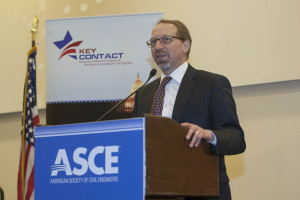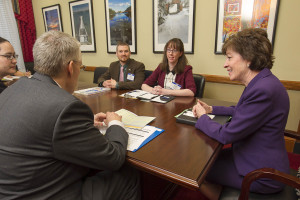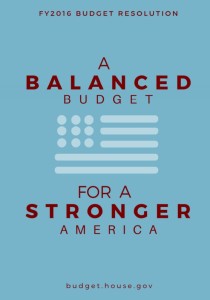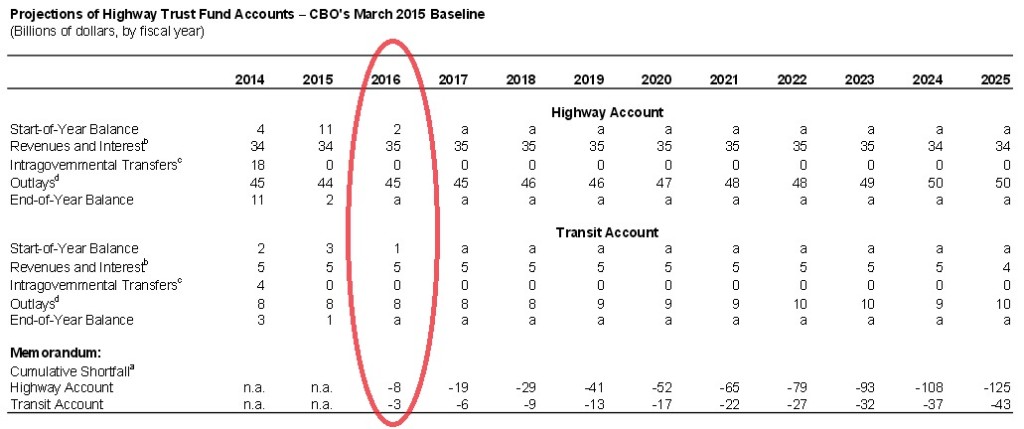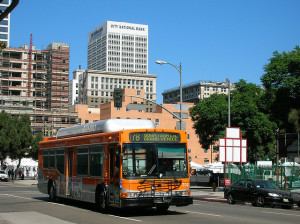Water main breaks, power outage and a thinning hourglass for federal highway funds
April 10th, 2015 | By: Olivia Wolfertz
Water main breaks, potholes and power outages are all results of underinvestment in infrastructure. Infrastructure is interconnected and greatly impacts our daily lives and national economy. The highway and transit policy and expires 51 days from today so it is critical that Congress act quickly to find a sustainable, long-term funding solution. Aging water infrastructure causes a water main break once every two minutes. On Wednesday, a 12-inch water main broke in New York City, forcing the evacuation of 500 people from a train and shutting down the surrounding trains and streets in the process. In California, the current water shortage crisis due to drought will require the state to spend $39 billion to meet its population’s drinking and, dry weather and a large population, means that they need to spend $39 billion to meet its population’s drinking water needs. Water infrastructure, including locks and dams, are critical to facilitating trade. According to the National Journal, more than $200 billion worth of goods are shipped every year on massive barges crawling along major rivers and tributaries. But the aging locks and dams built nearly a century ago are hindering ships’ ability to transport goods efficiently. “Just imagine what that does for commerce—if you’re shipping a product down the river and it just stops,” ASCE Past President Greg DiLoreto said. “There’s a real economic tie to the condition of this infrastructure.” In addition to water infrastructure, electric infrastructure also needs maintenance and attention. On Tuesday, a widespread power outage in D.C. and the surrounding area affected many government buildings, four surrounding museums and select subway stations. Water and electricity infrastructure are crucial to our nation’s economy and trade and impact the daily life of all Americans. The highway and transit policy expires in less than two months. It is important that Congress work together to pass legislation to provide a sustainable, long-term funding solution to #FixTheTrustFund.Tags: highway trust fund, water infrastructure
No Comments »
It's Time Again to GROW America
April 1st, 2015 | By: America's Infrastructure Report Card
 During a recent interview with Politico’s Mike Allen, U.S. Secretary of Transportation Anthony Foxx noted that the nation’s transportation system is “in a huge ditch.” Yesterday, the U.S. Department of Transportation (USDOT) unveiled its idea on how to get America out of that ditch with their GROW America proposal. If the name sounds familiar, it’s because that was the original title of the previous federal surface transportation program proposal unveiled by the Obama Administration last year. The key difference this year is that the Administration has identified a specific funding source, taxing overseas corporate profits, to pay for the $478 billion, six-year bill.
The GROW America proposal, among other things, would:
• Increase the nation’s overall investment in transportation by 45%, with a 29% increase in highway spending and a 76% increase in transit spending;
• Provide $18 billion for a multi-modal freight program that strengthens America’s exports and trade;
• Include $28.6 billion for passenger rail programs;
• Double funding for the TIGER competitive discretionary grant program and create a new $6 billion highway and transit competitive grant program; and
• Double the Transportation Infrastructure Finance and Innovation Act (TIFIA) program which encourages utilization of innovative financing mechanisms.
USDOT published a state-by-state impact of the benefits of GROW America investment which included ASCE Report Card data on state needs and economic impacts. The GROW America Act is an important legislative marker that seeks to define the debate about the need to increase federal infrastructure investment in order to meet current and future capacity and maintenance challenges. Funding certainty is important to states for delivering projects, as the six-year time frame supports, but of additional importance is the need to increase overall federal funding. The current revenue rates have not risen since 1993 and since that time the cost to deliver projects has increased. Since 1993, in real terms, the average federal highway dollar has lost over a third of its purchasing power. Please urge your members of Congress to act now to grow the federal surface transportation program and fix the Highway Trust Fund.
During a recent interview with Politico’s Mike Allen, U.S. Secretary of Transportation Anthony Foxx noted that the nation’s transportation system is “in a huge ditch.” Yesterday, the U.S. Department of Transportation (USDOT) unveiled its idea on how to get America out of that ditch with their GROW America proposal. If the name sounds familiar, it’s because that was the original title of the previous federal surface transportation program proposal unveiled by the Obama Administration last year. The key difference this year is that the Administration has identified a specific funding source, taxing overseas corporate profits, to pay for the $478 billion, six-year bill.
The GROW America proposal, among other things, would:
• Increase the nation’s overall investment in transportation by 45%, with a 29% increase in highway spending and a 76% increase in transit spending;
• Provide $18 billion for a multi-modal freight program that strengthens America’s exports and trade;
• Include $28.6 billion for passenger rail programs;
• Double funding for the TIGER competitive discretionary grant program and create a new $6 billion highway and transit competitive grant program; and
• Double the Transportation Infrastructure Finance and Innovation Act (TIFIA) program which encourages utilization of innovative financing mechanisms.
USDOT published a state-by-state impact of the benefits of GROW America investment which included ASCE Report Card data on state needs and economic impacts. The GROW America Act is an important legislative marker that seeks to define the debate about the need to increase federal infrastructure investment in order to meet current and future capacity and maintenance challenges. Funding certainty is important to states for delivering projects, as the six-year time frame supports, but of additional importance is the need to increase overall federal funding. The current revenue rates have not risen since 1993 and since that time the cost to deliver projects has increased. Since 1993, in real terms, the average federal highway dollar has lost over a third of its purchasing power. Please urge your members of Congress to act now to grow the federal surface transportation program and fix the Highway Trust Fund.
Tags: congress, highway trust fund, infrastructure, report card, transportation
No Comments »
ASCE Members Meet With US Lawmakers
March 30th, 2015 | By: Becky Moylan
“Let’s win this for our country,” proclaimed ASCE President Robert D. Stevens, PhD, PE to a room of nearly 200 ASCE members who descended on the nation’s capital to encourage members of Congress to fix the Highway Trust Fund last week. The group visited Washington, D.C. as part of the 15th annual ASCE Legislative Fly-In, which offers the opportunity for ASCE members to engage with their elected representatives and senators about the policy issues that impact civil engineers. The two-day event included briefings on federal legislative issues, including the Water Resources Reform and Development Act (WRRDA) appropriation process and the need for Congress to pass a long-term transportation bill this year. To further the conversation on transportation, attendees were addressed by the U.S. Department of Transportation Under Secretary for Policy, Peter Rogoff on Tuesday evening and Congressman Earl Blumenauer (D-OR) on Wednesday morning. Rogoff thanked the group for making the journey to Washington to highlight this important issue, remarking “No one is closer to infrastructure than you and your colleagues.” He then outlined the reasons America needs a bolder plan for the future to meet the demands of a growing population. Despite the major maintenance needs in addition to needs to account for future growth, the transportation network is, as Rogoff put it, “starved for funds.” Rogoff warned that with 32 short-term extensions, local and state leaders tend to stop planning long-term projects, which can take many years of planning and building. “When you have 32 short term extensions people lose their vision. Why would you plan a project…if you don’t know the federal government will pay its bills eight months hence?” he asked rhetorically. This is why it is so important to fix the Highway Trust Fund in a way that increases funding: so that we can move beyond the status-quo, and start shaping the future of our transportation network. For example, Rogoff pointed to the Administration’s GROW AMERICA Act, which increases funding for public transit to ensure it can be upgraded to meeting growing demand. The administration is pushing hard for an increase in investment, because they believe that given the political challenges facing this legislation at the end of it there should at least be positives to show for it. “It is no victory to maintain current levels of spending,” said Rogoff. Ultimately, Rogoff had cautious optimism that there could be a multi-year bill passed this year. “Mayors and governors are starting to sound off this is no way to run this program. You can say it with even more credibility,” he concluded. Congressman Blumenauer (D-OR) shared an equally compelling message. The $3.6 trillion investment need estimated by ASCE is “within our capacity and … will repay for itself” he said, adding that it would bring down the deficit in the long term. Blumenauer highlighted many benefits that would result from increasing investment in transportation, including reducing time wasted sitting in traffic, enhancing quality of life for every family, and creating jobs in a range of opportunities. The Congressman earlier this year proposed the UPDATE Act, HR 680, which would raise the rate of the gas tax by five cents for the next three years then tie it to inflation to address the funding deficit in the Highway Trust Fund. When he introduced the bill, he had 20 co-sponsors and endorsements from many organizations, including ASCE. He acknowledged that many of his colleagues are wary of repercussions from voting for a tax increase. To help them find the political courage, Blumenauer told the Fly-In attendees to reassure them that there is sufficient political cover. “Ninety-eight percent of the legislators that voted to increase the gas tax [on the state level] got re-elected in 2014. Make it clear that what ends the career is allowing the country to fall apart if they can’t meet the needs of your community,” said Blumenauer. As further evidence of the historically bipartisan nature of infrastructure investment, Blumenuaer recounted when President Reagan called on Congress to more than double the gas tax in his 1982 Thanksgiving address. Congress responded by doing so when they returned to Washington after the holiday. In conclusion, Blumenauer shared that he counts on ASCE for continued support on this issue and to help get a bill passed: “I hope we’ll be at a signing ceremony in the future for a six-year re-authorization.” The 200 ASCE members in attendance then headed to Capitol Hill to meet with members of Congress and their staffs of 46 states and the District of Columbia. Following the meetings, the group reconvened at a reception in the U.S. Capitol Cannon Caucus Room featuring a Dream Big!: Engineering Wonders of the World theme in anticipation of the ASCE-sponsored IMAX film coming out next year. ASCE members and Congressional staffers were able to continue their conversations from the afternoon while networking and having some fun taking photos in front of a green screen photo booth, which then transformed the background into iconic infrastructure backdrops. During the proceedings, Sen. Barbara Boxer (D-CA) and Rep. Bill Shuster (R-PA) were both presented with awards naming them Honorary Fellows of the Society. Sen. Boxer was selected in honor of her more than 30 years of public service, which includes 24 in the U.S. Senate. As Chairwoman of the Environmental and Public Works Committee, she led the effort to enact the Water Resources Reform and Development Act (WRRDA) and the Moving Ahead for Progress in the 21st Century Act (MAP-21). Rep. Bill Shuster earned ASCE’s recognition for his efforts as an eight-term member of the House of Representatives. As Chairman of the Transportation & Infrastructure Committee, he helped shepherd the passage of MAP-21 and steered the effort to enact WRRDA. Including last week’s inductees, there have only been 38 Honorary Fellows named by the Society. Also recognized during the Fly-In were the winners of the inaugural Outstanding Civil Engineer Advocate of the Year awards, recognizing an individual and group who went above and beyond in advocating for ASCE’s issues in the past year. This year’s winners were Darren Benoit of New Hampshire and the Louisiana Section. The two days encapsulated the resolve the American Society of Civil Engineers has to encourage Congress to fix the Highway Trust Fund with a long-term, sustainable solution. To contribute in this effort, sign up to be a Key Contact today.Tags: advocacy, fly-in, highway trust fund
Comments Closed
States Stepping Up
March 24th, 2015 | By: Becky Moylan
A growing number of states are taking action during their legislative sessions to increase investment in transportation. This trend is in vogue for several reasons. First, many states that have taken action have done so after years of kicking the can down the road. For example, Iowa’s 10-cent increase is the first boost since 1989. In that time, the cost of most other goods has nearly doubled. Yet, Iowa was trying to fund 2015 roads and bridges on 1989 dollars. That underinvestment was costing the state’s economy in other ways, as a recent assessment by TRIP demonstrated. Iowa’s roads and bridges are costing each Iowan $2 billion in additional vehicle operating costs, lost time and fuel due to traffic congestion, and financial costs from traffic accidents. Thanks to the increased revenues, the state will begin addressing many of its needs. Second, bipartisan action reflects the increasing understanding that deferring maintenance in the face of a funding deficit hurts economic competitiveness. Utah, another state that passed gas tax increase legislation this session, is expected to have huge population growth in the coming decades. To meet future needs, as well as address a projected funding shortfall, that state needed to increase its investment. Investing in roads and bridges has historically been a place of agreement from both sides of the aisle, and that trend continues this year. Another reason we have seen action is that people are sick of potholes and sitting in traffic and are becoming increasingly vocal about their desire to have safe, well-maintained roads and bridges. In the press release South Dakota Gov. Daugaard issued after signing his state’s gas tax increase into law, he emphasized that maintaining roads and bridges is one of the fundamental functions of government. The more lawmakers hear from constituents on the need for better roads and bridges and greater access to transit, the more likely they are to make it a legislative priority. Several other states are poised to take action this year that would better fund transportation. In legislative action, Idaho, Georgia and Washington are all considering and compromising on bills that would address each respective state’s needs. Also on the horizon are Minnesota, North Carolina and Nebraska. In Michigan, voters will head to the polls on May 5th to decide on a ballot measure that would increase funding for the Great Lakes state’s transportation network—a measure endorsed by many influential groups, the Governor, and the Detroit Free Press. All of this action at the state level, however, cannot take the place of the federal government’s essential role in transportation investment. To continue the momentum of this year’s state action—along with the trend of the past few years—the U.S. Congress needs to find a long-term, sustainable solution to fix the Highway Trust Fund. If they fail to act, our nation’s economic competitiveness is in jeopardy and states will be stuck with a much larger tab, or an even longer backlog of projects.Tags: congress, gas tax, highway trust fund, state government
No Comments »
Ice Cream Funding for Roads
March 20th, 2015 | By: Olivia Wolfertz
With spring approaching and our nation’s roads baring the battle scars of another rough winter, the dialogue surrounding the Highway trust Fund and need for a sustainable transportation solution is accelerating at the federal level and inspiring states to take more action. In Michigan, residents have responded to their road needs by creating a pothole challenge to identify the worst potholes in the state. One creative business entrepreneur even invented a pothole ice cream flavor to generate awareness about road funding needs, and plans to donate 1 percent of sales from the product to the state for repairs . Come May 5, voters will be asked to consider Proposal 1, which among other things would boost the state sales tax to 7 percent to eventually generate an extra $1.2 billion annually for roads. Congress’ 2016 fiscal budget release, which proposes levying a onetime toll on untaxed foreign earnings currently sitting overseas and using the proceeds to pay for infrastructure projects, has generated more federal dialogue on transportation needs. During National Journal’s “Running on Empty: Tackling America’s Infrastructure Crisis” event on Thursday in Washington, D.C., Transportation Secretary Anthony Foxx and House Transportation and Infrastructure Committee Chairman Bill Shuster discussed our transportation funding needs in relation to the new budget proposals. “I feel confident that we will do a long-term bill, a five- or six-year bill,” Shuster said, “because both sides of the aisle, both sides of the Capitol, both ends of Pennsylvania Avenue, everybody’s talking about a long-term bill.” Though raising the federal gas tax is not on the immediate horizon for many states, several states have benefited from gas tax raises to generate transportation funding. ASCE Senior Managing Director Casey Dinges, reported that 11 states, both conservative and liberal, have raised their fuel taxes since 2013. Recently South Dakota signed legislation to increase its 22-cent gas tax by six cents starting April 1. While the decision regarding long-term, sustainable transportation funding must be made at the federal level, the outcome of the decision affects each American. Congressman John Delaney invited Maryland residents to share how America’s infrastructure has affected their daily lives. He wants Congress to understand how “long commutes, unsafe bridges and overcrowded ports, railways and airports have a direct impact on people’s lives, on their businesses, on the amount of time we all are able to spend with our loved ones.”Our nation’s infrastructure needs are great, and every day from Main Street to Wall Street Americans are paying the price. It is critical that Congress work quickly to pass legislation to provide a sustainable, long-term funding solution to #FixTheTrustFund.
Tags: congress, highway trust fund, roads
1 Comment »
Budgets Represent Priorities
March 19th, 2015 | By: America's Infrastructure Report Card
This week the U.S. House of Representatives and the U.S. Senate majorities unveiled their fiscal year 2016 (FY16) budgets. Traditionally, passing a budget in Congress is a particularly partisan endeavor with most all members in the majority voting in favor of their budget, and all the minority members voting against it. Should this Congress pass a budget in the coming weeks, it will not have to go to President Obama for his signature as budgets are self-imposed restrictions on Congressional spending. However, occasionally Congress has increased funding levels for certain programs despite the budget instructing them not to do so. These proposals offer some insight into what transportation funding levels might look like in the coming year. Disappointing for transportation was that both the House and Senate budgets assumed that road, bridge and transit spending would be limited to incoming revenues to the federal Highway Trust Fund (HTF). This is a problem as the HTF has been facing fiscal pressure over the years and is forecast to require $13 billion in additional revenues in FY16 just to maintain current spending levels. Which is why ASCE supported a House Budget Committee amendment by Congresswoman Kathy Castor (D-FL) that would have maintained current spending levels for surface transportation. Unfortunately, the amendment failed in committee by a vote of 14-22. Better for transportation in the House and Senate budgets is the creation of what is known as a “reserve fund” for the HTF, which would allow the tax committees to determine how best to fill the trust fund hole in a way that is deficit-neutral. These ways could include raising taxes (including the federal gasoline tax), cutting spending, or transferring other government funds to transportation. ASCE called for and supported the creation of this HTF reserve fund, however in order to increase spending for other infrastructure sectors, like water, dams and levees, a broader Infrastructure Reserve Fund is also needed. Senate Budget Committee Ranking Member Bernie Sanders (I-VT) introduced such an amendment in committee, which ASCE supported, but unfortunately that too was defeated on a party-line vote. Earlier this year, ASCE endorsed legislation introduced by Senator Sanders that would increase funding for our nation’s transportation, water and other infrastructure sectors. The Senator is expected to offer other infrastructure-related amendments on the Senate floor when the budget is up for a vote there next week. The debate over the last few days on the budget has crystallized one key fact on transportation spending: the vast majority in Congress believe that we should be investing more in transportation but there is not yet widespread bipartisan consensus on exactly how to pay for it. ASCE needs your help to tell Congress to work quickly to identify a long-term, sustainable funding solution that would #FixTheTrustFund before the legislative deadline of May 31, 2015.Tags: congress, highway trust fund, infrastructure, transportation, water infrastructure
No Comments »
Action to Fix Highway Trust Fund Needed by This Summer
March 9th, 2015 | By: America's Infrastructure Report Card
Tags: bridges, highway trust fund, infrastructure, roads, transit, transportation
No Comments »
The Excitement of Infrastructure
March 2nd, 2015 | By: Becky Moylan
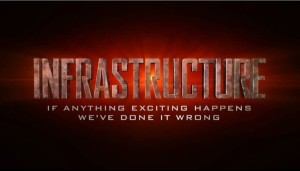
HBO’s Last Week Tonight with John Oliver “proposed” a movie on the importance of infrastructure maintenance.
Tags: failure to act, gas tax, highway trust fund
No Comments »
This Week in Infrastructure: State Solutions, Innovations for Infrastructure Improvement
February 20th, 2015 | By: Olivia Wolfertz
A bus tour sharing the message we need to invest in infrastructure to “Grow America”, increased momentum towards state-level gas tax increases and new transportation innovations are all building momentum towards improving our nation’s infrastructure. On Wednesday morning in Los Angeles a water main broke that was installed in 1926, causing flooding and damage to nearby buildings and roads. According to The Times’ analysis of LA Department of Water and Power (DWP) data, Los Angeles’ system of water pipes has averaged nearly 1,200 leaks a year since 2010, and water main leaks and breaks occur on average about three times a day across the city. Vice President Joe Biden and Transportation Secretary Anthony Foxx recently returned from a tour through five states to promote the Grow America Act, which would invest $478 billion in infrastructure across the nation. It would be partly paid for through a one-time tax on currently untaxed corporate earnings, is considered by Biden and Foxx to be a bipartisan funding initiative and critical to economic growth and job creation. In absence of federal funding solutions, many states have come up with innovative ways to fund local transportation infrastructure. Aside from raising state gas taxes, which Iowa and Utah legislatures are in the process of doing, there have been innovative technologies to help improve safety and make trips easier. For example, the Minnesota Department of Transportation (MnDOT) has created an app that would assist the visually impaired to get around the city by navigating them and helping them avoid construction sites, as many are left to navigate the cities by foot due to lack of sufficient transit[MB1] In Los Angeles, a new app was launched to allow riders to pay for the commuter buses via their mobile phones with the aim of promoting more ridership on public transit. Regardless of innovative transportation improvements and state gas taxes, The Highway Trust Fund is headed towards insolvency in a matter of months. It’s imperative that members of Congress work together to pass legislation that will provide a sustainable, long-term funding solution to #FixTheTrustFund.Tags: gas tax, highway trust fund, water infrastructure
No Comments »
What Does the Foxx Say?
February 19th, 2015 | By: Becky Moylan
While it might not be as amusing as this, this week U.S. Transportation Secretary Anthony Foxx said that a quality transportation network is important to the future of the nation and he urged Congress to quickly adopt a multi-year surface transportation bill. Secretary Foxx did so as he rolled through a few southern states in a bus he named the Grow America Express, a nod to the name of the Obama Administration’s surface transportation authorization bill. Foxx made visits to multiple states to promote the administration’s plan, at times accompanied by Vice President Joe Biden in both North and South Carolina.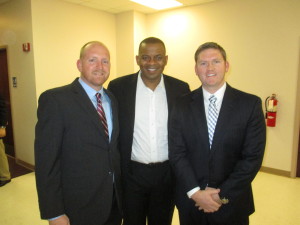
Pictured from L to R: David Crombie, E.I., A.M.ASCE (ASCE Tallahassee Branch Vice President), USDOT Secretary Anthony Foxx, and Jeremy Clark, P.E., M.ASCE (ASCE Tallahassee Branch President)
- Tallahassee, FL: David Crombie, E.I., A.M.ASCE (ASCE Tallahassee Branch Vice President) and Jeremy Clark, P.E., M.ASCE (ASCE Tallahassee Branch President)
- Charleston, SC: Chuck Black, P.E., M. ASCE (ASCE South Carolina Section, Eastern Branch Director)
- Columbia, SC: Edward Owens, P.E, M.ASCE (ASCE South Carolina Section President) and Petrina Butler, P.E., M.ASCE (ASCE Upstate South Carolina Branch President) and Jennifer Muster, P.E.,M.ASCE (ASCE Upstate South Carolina Branch)
- Charlotte, NC: Daniel Bridges, P.E, M.ASCE (ASCE North Carolina Section President)
- Raleigh, NC: Robert Cagle, P.E, F.ASCE (ASCE Region 4 Governor)
- Washington, DC: Veronica Davis, P.E, M.ASCE (ASCE Transportation Policy Committee member) and Robert Victor, P.E, F.ASCE (ASCE Committee on America’s Infrastructure member)
Tags: highway trust fund, surface transportation
No Comments »



 */ ?>
*/ ?>




